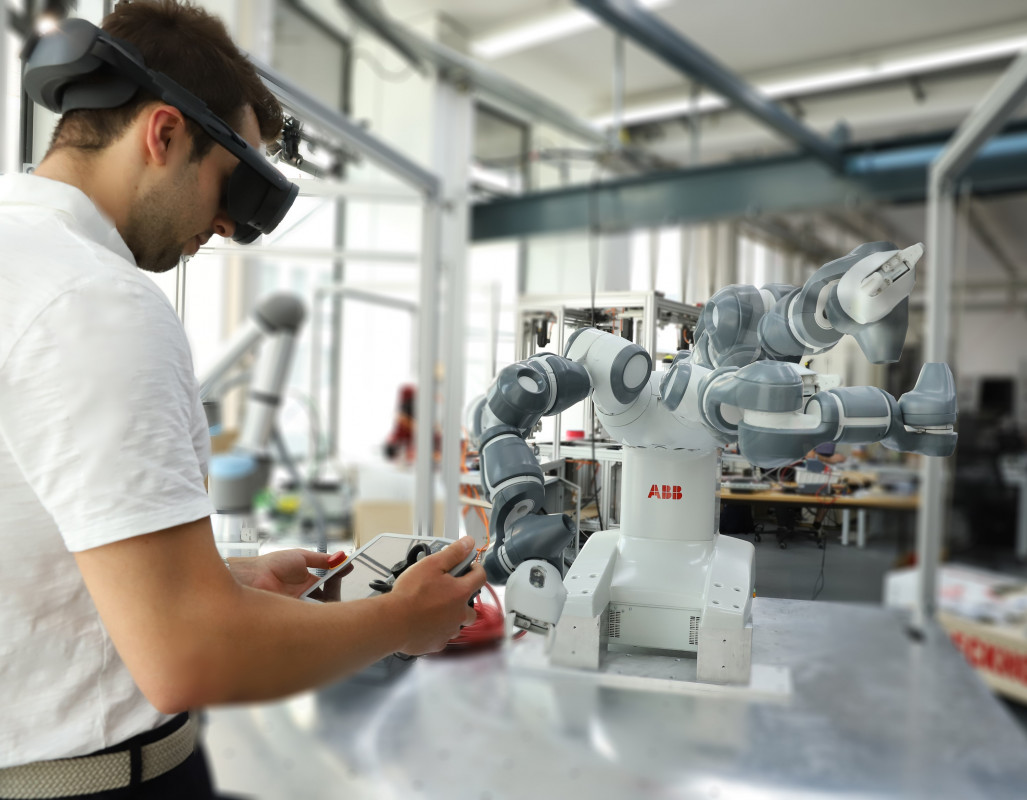
The newly founded Robotics Institute Germany (RIG) has started its work with a kick-off event. The consortium, led by the Technical University of Munich (TUM) and the Karlsruhe Institute of Technology (KIT), brings together research, resources and infrastructures and aims to make Germany the world's leading centre for AI-based robotics. The University of Stuttgart is a founding partner and is involved in RIG through the Institute for Artificial Intelligence and the Institute for Control Engineering of Machine Tools and Manufacturing Units (ISW).
Intelligent robots are not only changing traditional industrial production, but are also advancing into more and more areas and changing life in healthcare and construction, in nursing or agriculture. Robotics is also considered to be a driver of innovation and economic growth and thus a key technology for Germany as an industrial location. "As a centre of science and industry, Germany has huge potential to become the world leader in AI-based robotics with its innovations in this field," says Prof. Alexander Verl, Head of the Institute for Control Engineering of Machine Tools and Manufacturing Units (ISW) at the University of Stuttgart. "And as a partner of the Robotics Institute Germany, we want to help realise this potential."
The new consortium brings together leading universities and non-university research institutions that want to use synergies in the future and become visible worldwide as a strong robotics alliance. Under the umbrella of RIG, research on AI-based robotics in Germany is to become globally competitive. Infrastructures and resources are to be shared, talents are to be promoted, benchmarks are to be developed and the transfer to industry is to be expanded. "The RIG is more than just a nationwide network that brings together the best scientists," says Prof. Kai Arras from the Institute of Artificial Intelligence at the University of Stuttgart. "It is a catalyst for innovation and economic progress."
As part of the RIG, Arras and his team from the AI Institute want to develop benchmarks that will enable new robot systems to be assessed in a standardised way in the future, making them comparable for practical use. The focus is on the use of the latest AI technologies that enable robots to gain a deep semantic and social understanding of their environments. As a former head of robotics research at Robert Bosch GmbH, he is also familiar with the needs of industry and will contribute this expertise to the design of the topics and talent programmes of the RIG.
The ISW brings its expertise in control technology and engineering tools for industrial robotics to the consortium and aims to strengthen entrepreneurship in the field of AI robotics. The institute forms the link between the RIG and its know-how on the one hand and industry and the start-up scene on the other. Together with the German Engineering Federation (VDMA), Verl wants to expand and stabilise the transfer of innovative and marketable robotics technologies into practice. In cooperation with ARENA 2036, a research campus of the University of Stuttgart, the aim is to make start-ups in the fields of production technology and mobility in particular compatible with the RIG.
In addition to the mobility campus ARENA 2036, the construction robotics laboratory of the excellence cluster Integrative Computer-Aided Planning and Building for Architecture (IntCDC) in Waiblingen and the Software Defined Manufacturing – Laboratory (SDM) of the ISW provide further infrastructures for excellent and application-oriented research within the framework of the RIG. In addition to the University of Stuttgart, the new consortium of excellence also includes the Fraunhofer Institute for Manufacturing Engineering and Automation (IPA) and the Max Planck Institute for Intelligent Systems (MPI-IS) as funded partners, as well as associated partners such as Europe's largest innovation campus for artificial intelligence, Cyber Valley, and the University of Tübingen. "The RIG now offers us the opportunity to further consolidate and strengthen the ecosystem in the Stuttgart/Tübingen region," explain Verl and Arras.
The Robotics Institute Germany (RIG) is funded by the Federal Ministry of Education and Research (BMBF) with 20 million euros (duration: 1 July 2024 to 31 June 2028). Under the leadership of the Technical University of Munich (TUM), the following institutions are participating in RIG, alongside the Karlsruhe Institute of Technology (KIT), which is taking on the role of spokesperson, and the University of Stuttgart: the University of Bonn, the Technical University of Berlin, the Technical University of Darmstadt, the University of Bremen, RWTH Aachen University, the Technical University of Dresden and the Technical University of Nuremberg, as well as the German Centre for Aerospace (DLR), the Max Planck Institute for Intelligent Systems (MPI-IS), three Fraunhofer Institutes (IPA, IOSB and IML) and the German Research Centre for Artificial Intelligence (DFKI), as well as 19 associated partners, including the Cyber Valley innovation campus and the University of Tübingen.

